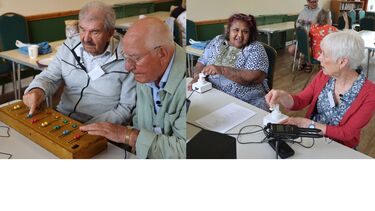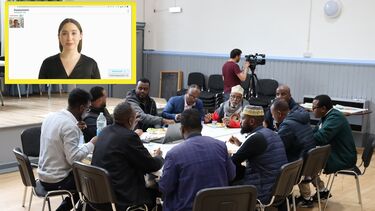- –°≈∑ ”∆µ of Sheffield is leading one of four new networks which will boost the use and development of novel tools and technologies enabling people with dementia to remain independent at home for longer
- Almost ¬£2 million in funding has been awarded to researchers at the –°≈∑ ”∆µ of Sheffield to co-develop adaptive technologies to evolve with the changing needs of people living with dementia and their families, from assisting with speech and memory to developing intuitive ways for online and face-to-face communication
- A survey by Alzheimer’s Society revealed 85 per cent of people would want to stay at home if diagnosed with dementia. There are currently around one million people in the UK with dementia. This is projected to rise to 1.4 million people by 2040
- The Sheffield team will host the BRIDGES for Dementia Network, which will be led by a consortium of researchers and stakeholders from across the UK
–°≈∑ ”∆µ is leading one of four new networks which will boost the use and development of novel tools and technologies enabling people with dementia to remain independent at home for longer.
The networks were announced on the day of the World Dementia Council Summit (25 March 2025), which is championing the role of innovation to deliver change through health systems.
The Sheffield-led team is one of four networks being awarded £6 million from the UKRI Engineering and Physical Sciences Research Council (EPSRC) and the National Institute for Health and Care Research (NIHR), in partnership with the charity Alzheimer’s Society.
The ¬£1.97 million funding will create the BRIDGES for Dementia network (Building Research Innovation co-Developing Greater Empowerment and Support for people living with Dementia). This will build research innovation communities that put empowerment at the heart of supporting people to live life on their own terms. The funding will allow researchers at the –°≈∑ ”∆µ of Sheffield to co-develop adaptive technologies to evolve with the changing needs of people living with dementia and their families, from assisting with speech and memory to developing intuitive ways for online and face-to-face communication. Examples could be tools to support word-Ô¨Ånding, platforms to engage with music or the arts, or new ways to interact in the face-to-face or online world.
The network will encourage the co-design of technologies in four key themes:
- indoor and outdoor spaces
- arts, sports and culture
- in-person and online communication
- digital technology development and translation
These themes prioritise tools that enable individuals with dementia to feel agency and in control as they continue to have an active and meaningful role in a rich daily life, and technologies that open up the world rather than dictate a limited set of activities or interactions.
BRIDGES network lead Dr Jennifer MacRitchie, from the –°≈∑ ”∆µ of Sheffield's Department of Music, said: ‚ÄúAt the heart of the BRIDGES network is an ambition for technology to better reflect the varied and unmet needs of people living with dementia and people who care for them, so that they can live on their own terms and remain an integral part of communities.
“We will be co-developing all of the new technology with people living with dementia and their families from the very beginning to ensure that our research can have a real impact and make a difference.”
Dr Jennifer MacRitchie who is also Co-Director for Muses, Mind, Machine and part of the Healthy Lifespan Institute at the –°≈∑ ”∆µ of Sheffield and Professor Li Su, Professor of Neuroimaging at the –°≈∑ ”∆µ of Sheffield‚Äôs Institute for Translational Neuroscience (SITraN), will lead an interdisciplinary team drawing on expertise in languages and communication, arts and humanities, engineering, human-computer interaction, design, medicine and population health, lived experience, and service delivery. BRIDGES network partners represent expertise across dementia awareness and lived experience, public health service and technology industry, and will facilitate access to communities and professionals.
Minister of State for Health, Karin Smyth said: “Dementia is a cruel and heartbreaking disease, not only for those living with it, but for the families and friends who often watch their loved one become a shadow of the person they once were.
“Backing these groundbreaking technologies won't just help people with dementia - it'll transform their lives, giving people the freedom to stay in their own homes, around the people they love.
“Moving care out of hospitals and into communities isn't just smart healthcare - it's about giving people independence. Britain will be at the forefront of dementia innovation, backing cutting-edge research and rolling out life-changing technologies that deliver real results for patients and families. This is exactly the bold thinking we need at the heart of our Plan for Change.”
Science Minister, Lord Vallance said: “Dementia is one of the biggest challenges to health and social care of our time. These four networks will take on that challenge, harnessing technology to improve the quality of life for those living with the disease.
“Helping people with Dementia to live more independently will allow us to move their care from hospitals to communities, reducing strain on the NHS and supporting the plans for health that are key to our Plan for Change.”
A survey by Alzheimer’s Society revealed that 85 per cent of people said they would want to stay at home for as long as possible if diagnosed with dementia.
The networks will lead research to help people living either at home or in residential settings, including private residents, care and nursing homes, sheltered accommodation and social housing.
The new research aims to support people living with dementia with everyday activities, from managing symptoms and health issues to enable social connections. The teams will explore how technologies can link up with existing health and social care services. This will help ease the burden on the NHS and support the shift towards moving care from hospitals to communities and making better use of technology.
They will work alongside people living with dementia and carers to ensure their lived experience and changing needs are at the heart of innovations.
BRIDGES network partners are:
- –°≈∑ ”∆µ (Dr Jennifer MacRitchie, Prof Li Su, Dr Daniel Blackburn, Dr Christian Morgner)
- Anglia Ruskin –°≈∑ ”∆µ (Dr Ming Hsu)
- Lancaster –°≈∑ ”∆µ (Dr Joseph Lindley, Dr Roger Whitham)
- London South Bank –°≈∑ ”∆µ (Prof Hua Zhong)
- –°≈∑ ”∆µ College London (Prof Tao Cheng)
- –°≈∑ ”∆µ of Cambridge (Prof Anna Korhonen)
- –°≈∑ ”∆µ of Kent (Dr Giovanni Masala, Prof Jim Ang)
- –°≈∑ ”∆µ of Leicester (Prof Huiyu Zhou)
- Innovations in Dementia
- Lewy Body Society
- Dementia UK
- Kent County Council
- Sheffield City Council
- Bow (Bettering Our Worlds through Robotics)




